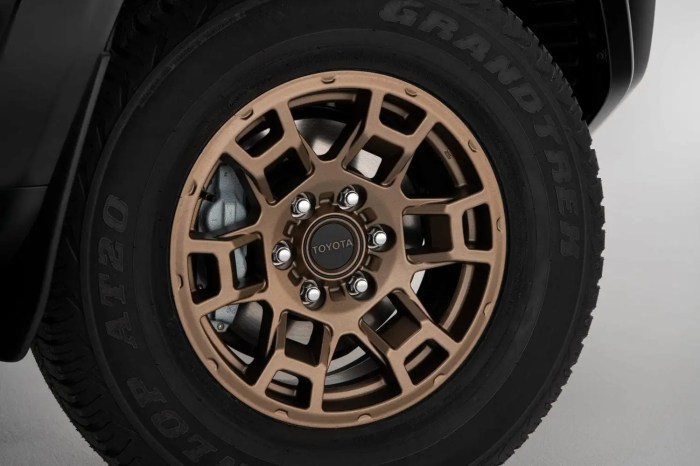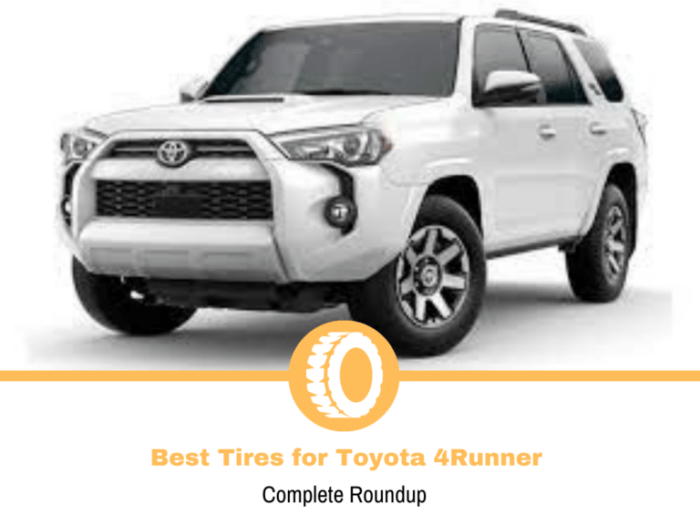Best Tires for Your Toyota 4Runner for Off-Roading and Performance – The Toyota 4Runner, a legendary SUV known for its ruggedness and off-road capabilities, deserves tires that match its prowess. Choosing the right tires significantly impacts your 4Runner’s performance, both on and off the pavement. This comprehensive guide delves into the best tire options for your 4Runner, considering factors like terrain, driving style, and budget. We’ll explore various tire types, tread patterns, and key features to help you make an informed decision.

Source: dealerinspire.com
Understanding Your 4Runner’s Needs
Before diving into specific tire recommendations, it’s crucial to understand your typical driving conditions. Do you primarily use your 4Runner for daily commuting, weekend adventures on mild trails, or serious off-road expeditions? Your answer will significantly influence the type of tire you need. Consider these factors:
Terrain:
- On-Road Primarily: If your 4Runner primarily sees pavement, prioritize all-season tires that offer a balance of comfort, handling, and longevity. Look for tires with a high treadwear rating.
- Mixed On- and Off-Road: For a blend of on-road manners and light off-road capability, all-terrain tires are a great compromise. They provide decent traction on various surfaces while maintaining reasonable on-road comfort.
- Serious Off-Roading: If you frequently tackle challenging trails, mud, rocks, and sand, mud-terrain tires are your best bet. These tires prioritize maximum traction and durability, even at the expense of on-road comfort and noise.
Driving Style:
- Aggressive Driving: If you drive aggressively, both on and off-road, consider tires with reinforced sidewalls and robust tread patterns to withstand impacts and punctures.
- Conservative Driving: For a more relaxed driving style, you can opt for tires that prioritize comfort and quietness over extreme off-road performance.
Budget:, Best Tires for Your Toyota 4Runner for Off-Roading and Performance
Tire prices vary significantly depending on brand, size, type, and features. Set a realistic budget before you start shopping to avoid buyer’s remorse. Remember that investing in high-quality tires can lead to better performance, longer lifespan, and increased safety.
Top Tire Choices for Your Toyota 4Runner
Here are some of the top-rated tires for Toyota 4Runners, categorized by their intended use:
All-Terrain Tires (Best for Mixed Use):
- BFGoodrich All-Terrain T/A KO2: A legendary all-terrain tire known for its durability, traction, and long lifespan. Excellent for both on-road and off-road use, making it a popular choice for 4Runner owners.
- Falken Wildpeak AT3W: A strong contender offering impressive traction in various conditions, including mud, snow, and gravel. Known for its relatively quiet on-road performance.
- Yokohama Geolandar A/T G015: A balanced all-terrain tire with good traction and a comfortable ride. A solid choice for those seeking a blend of on and off-road capabilities.
Mud-Terrain Tires (Best for Serious Off-Roading):
- Nitto Trail Grappler M/T: Designed for extreme off-road conditions, these tires offer exceptional traction in mud, sand, and rocks. However, expect increased road noise and slightly reduced on-road handling.
- Toyo Open Country M/T: Another popular mud-terrain tire known for its aggressive tread pattern and excellent grip in challenging terrains. Provides good durability and longevity.
- Cooper Discoverer STT Pro: A robust mud-terrain tire suitable for heavy-duty off-road use. Offers excellent traction and puncture resistance.
Factors to Consider When Choosing Tires:
- Tire Size: Ensure the tire size is compatible with your 4Runner’s specifications. Check your owner’s manual or the sticker on your driver’s side doorjamb for the recommended tire size.
- Load Index and Speed Rating: These ratings indicate the tire’s load-carrying capacity and maximum speed. Choose tires with ratings that meet or exceed your 4Runner’s requirements.
- Treadwear Rating: This rating indicates the tire’s expected lifespan. A higher treadwear rating generally means longer tire life.
- Traction Rating: This rating indicates the tire’s grip on wet surfaces. A higher traction rating signifies better wet-weather performance.
- Temperature Rating: This rating indicates the tire’s ability to withstand high temperatures. A higher temperature rating is beneficial for off-road use.
Tire Rotation and Maintenance
Proper tire rotation and maintenance are essential for maximizing tire lifespan and ensuring optimal performance. Follow your 4Runner’s recommended tire rotation schedule and regularly check tire pressure, tread depth, and for any signs of damage.
Frequently Asked Questions (FAQ)
What is the best tire size for a Toyota 4Runner?
The best tire size depends on your 4Runner’s year and trim level. Consult your owner’s manual or the sticker on your driver’s side doorjamb for the recommended tire size. Many 4Runners use sizes like 265/70R17 or 285/70R17, but aftermarket options are abundant.
How often should I rotate my tires?
It’s generally recommended to rotate your tires every 5,000-8,000 miles, or as specified in your owner’s manual. Proper rotation ensures even wear and tear.
How do I check my tire pressure?
Use a reliable tire pressure gauge to check your tire pressure at least once a month, or before long trips. The recommended tire pressure is usually found on a sticker on your driver’s side doorjamb.
What is the difference between all-terrain and mud-terrain tires?
All-terrain tires offer a balance of on-road and off-road performance, while mud-terrain tires prioritize extreme off-road traction, often at the expense of on-road comfort and noise.
Conclusion
Selecting the right tires for your Toyota 4Runner is a crucial decision that impacts its performance, safety, and longevity. By carefully considering your driving style, terrain, and budget, you can choose tires that perfectly match your needs. Remember to prioritize safety and always consult with a tire professional if you have any questions or uncertainties.
References: Best Tires For Your Toyota 4Runner For Off-Roading And Performance
Call to Action: Ready to upgrade your 4Runner’s tires? Visit your local tire shop or browse online retailers today to find the perfect set of tires for your adventures!
Frequently Asked Questions
What is the difference between all-terrain and mud-terrain tires?
All-terrain tires offer a balance of on and off-road performance, while mud-terrain tires prioritize maximum traction in extreme off-road conditions, often at the expense of on-road comfort and noise.

Source: tirehungry.com
How often should I rotate my tires?
Tire rotation frequency depends on your vehicle and driving habits, but generally, it’s recommended every 5,000-8,000 miles to ensure even wear.
What tire pressure should I use?
Refer to your vehicle’s owner’s manual or the sticker on your driver’s side doorjamb for the recommended tire pressure.
How do I know when to replace my tires?
Check your tires regularly for tread wear, bulges, cuts, or embedded objects. If the tread depth reaches the wear bars, or you notice any damage, it’s time for replacement.
